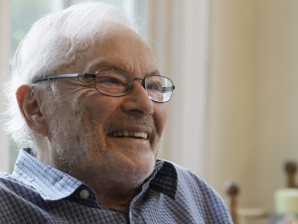‘Where The Wild Things Are’ author Sendak dies
NEW YORK – Maurice Sendak, the author who introduced millions of children worldwide to mischievous Max and his monsters in “Where The Wild Things Are,” died Tuesday, his publisher said. He was 83.
“He died on Tuesday in Danbury, Connecticut. The cause was complication from a recent stroke,” Erin Crum, at HarperCollins in New York, told AFP.
Critics say it is impossible to imagine children’s literature without Sendak, a New Yorker whose darkly original works across a 60-year career have been translated into dozens of languages.
He “wrenched the picture book out of the safe, sanitized world of the nursery and plunged it into the dark, terrifying and hauntingly beautiful recesses of the human psyche,” according to The New York Times.
The New York Daily News said he’d possessed “the highest order of genius.”
Article continues after this advertisementAlthough the 1963 “Where The Wild Things Are” is the best known, being turned into a popular movie in 2009, Sendak penned and illustrated nearly 50 books, including the acclaimed “Little Bear” series.
Article continues after this advertisementMemorable works include “Pierre” about a troublesome child whose constant refrain throughout the book is “I don’t care!”
Other perennial favorites are “Really Rosie,” “In the Night Kitchen,” and “Outside Over There.” In his later career, he put his visual imagination to work as a set and costume designer for major opera and ballet productions in Britain and the United States.
He won the prestigious Caldecott prize for children’s literature, the Newbery medal, the international Hans Christian Andersen Award, a National Book Award, the Astrid Lindgren Memorial Award and a National Medal of Arts.
President Barack Obama read “Where the Wild Things Are” to children at the annual White House Easter egg roll on April 9, mimicking the monsters in a loud voice.
On Tuesday, the White House spokesman said “every parent must be in a little bit mourning today and for every child who grew up with that book, it’s a sad day.”
Another presidential accolade came from Bill Clinton in 1996, who described Sendak as having “singlehandedly revolutionized children’s literature.”
“Where The Wild Things Are,” in which Max, wearing a wolf suit, is sent to his bedroom by his mother, but leaves for a mysterious land where he tames enormous monsters, was controversial at first.
Some libraries refused to stock the book. Sendak later said he modeled the toothy monsters on his own relatives.
In an interview with NPR radio, Sendak, who discovered late in life that he was gay, said he’d never wanted children and that his own childhood had been filled with anxieties and frustrations.
If he did have children, he said, it would have to be a daughter, because “girls are infinitely more complicated than boys.” If he had a son, he said, he’d abandon him in a public place “where somebody who needs a kid would find him and he would be all right.”
Born to Polish-Jewish immigrant parents in Brooklyn, New York, he grew up in the shadow of the Holocaust in which many of his relatives had perished.
However, he was uninterested in being a practicing Jew, saying his “gods” were the great authors and composers. “These are wonderful gods who have gotten me through the narrow straits of life,” he told NPR.
He said old age brought him sadness because friends “die and I can’t stop them. They leave me and I love them more.” But of his own eventual death, he said, “I’m ready, I’m ready.”
Actor Elijah Wood, who starred in movies based on another children’s classic, J. R. R. Tolkien’s “The Lord of the Rings,” Tweeted: “Maurice Sendak has left us for the land of the wild things. May he carry on adventuring.”
